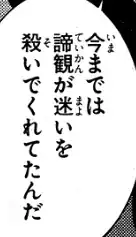I am not sure what this means...That line is said by the speaker to the listener.
「諦観{ていかん}」 = resignation
「削{そ}ぐ」 = to discourage; to weaken; to reduce (here I found that this verb can be written like this 「殺{そ}ぐ」with the kanji that it usually for 'kill' and I think here it was used to give it a more serious nuance)
「迷{まよ}う」= to lose one's way; to waver; to hesitate;
How would 「諦観{ていかん}が迷{まよ}いを殺{そ}いでくれてたんだ」 translate...?
"Your resignation weakened me?" (I am so unsure of what the speaker is saying)
